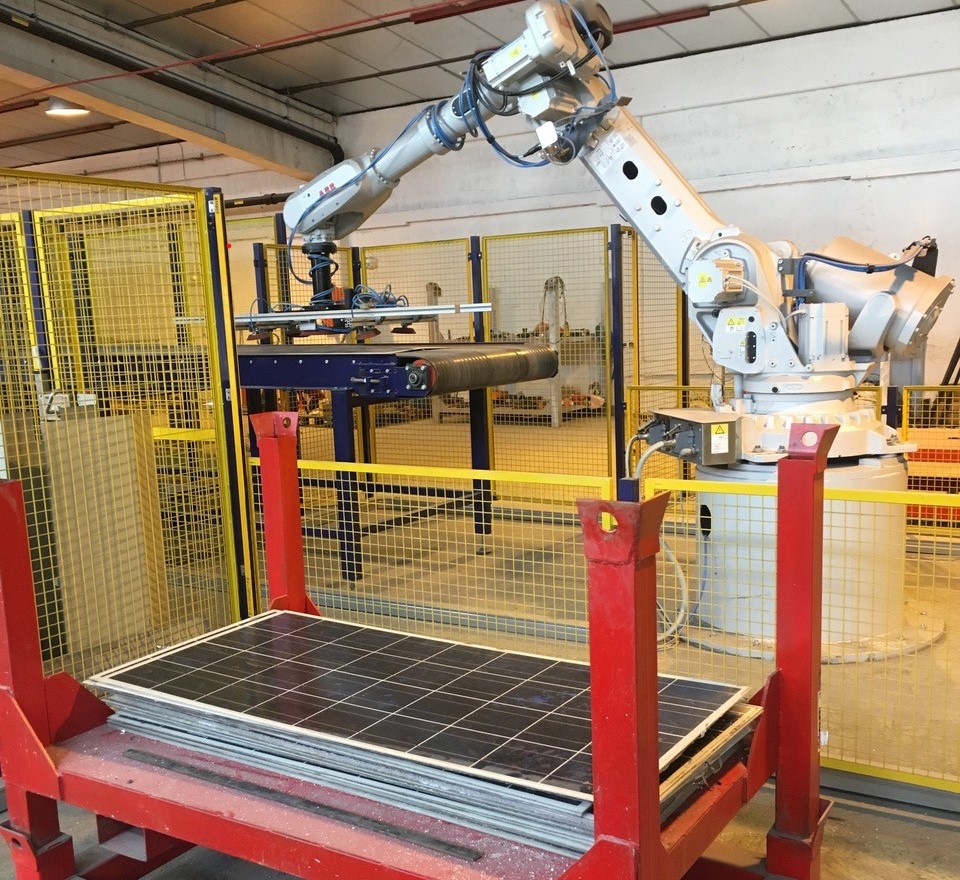From pv magazine global
Italian PV module recycling consortium La Mia Energia says the Photo Voltaic Panel Mobile Recycling Device (PV-MoReDe) it has developed can almost completely recover raw materials including furnace-ready glass, silicon, copper and aluminum.
The process differs from conventional thermo-chemical panel recycling approaches by using a series of patented mechanical steps. Mia Energia said its technique can recycle any kind of PV panels in any state, including broken and soiled items.
“The most important part is glass separation,” said Mauro Zilio, owner of Italian PV recycling company Yousolar, which is part of the Mia Energia consortium. “White glass is in great demand because it is difficult to find it without impurities.”
Before recycling begins, an operator uses a machine to place panels on a machine which removes the aluminum frame and electric wires box. Modules are then placed on pallets to be manipulated by a robot supplied by Swiss electronics company ABB. The robot guides modules through special suction cups and feeds them into a squares cutter. The cutter divides the panels into squares ready to enter the recycling process.
Recycling
Recovered materials are bagged, weighed on electronic scales and then replaced by the operator to keep the process moving.
Mia Energia said it takes around 40 seconds to recycle each panel, depending on size and recycling site conditions, and the system can process around 1.2 tons per hour.
“We can also separate all PVC, silicon and copper,” Zilio told pv magazine. “Silicon is pure, with a gradation ranging from 45-65%.”
Mia Energia said the recycling process can be set up on a mobile as well as fixed basis, with the former based inside a 13m container and able to operate from a truck on site. The recycling consortium added, even the fixed version of the process can be transported between sites in containers.
Zilio said the recycling solution was not promoted by the consortium previously “as it was a prototype to be developed” until two months ago. “Today, 99% of the raw materials are recovered and up to 800-1,000 panels per day can be treated,” he added.
“Contrary to all the tests they are doing in the rest of the world, the plant works only with mechanical separation, without using heat or chemicals,” said Zilio. “In fact, it does not even generate dust.”
The Yousolar owner pointed out, use of solar panels on any building where the PV-MoReDe is installed could mean the technology runs on a sustainable basis.
Sustainability in solar and storage
In May, pv magazine launched the UP sustainability initiative. Our goal is to dive deep into the topic of what it means to be truly sustainable, looking at what is already being done and discussing areas for improvement. In addition to quarterly themes on issues such as lead in solar and green finance, we have looked at biodiversity, sustainable flying and raw material sourcing in batteries. Read more, stay tuned and get involved! Check out our quarterly themes and UP coverage to date.
This content is protected by copyright and may not be reused. If you want to cooperate with us and would like to reuse some of our content, please contact: editors@pv-magazine.com.









“Mia Energia said the recycling process can be set up on a mobile as well as fixed basis, with the former based inside a 13m container and able to operate from a truck on site. The recycling consortium added, even the fixed version of the process can be transported between sites in containers.”
Interesting, one could actually “take” the recycling out to large scale solar PV farms and recycle panels on site without onerous shipping costs.